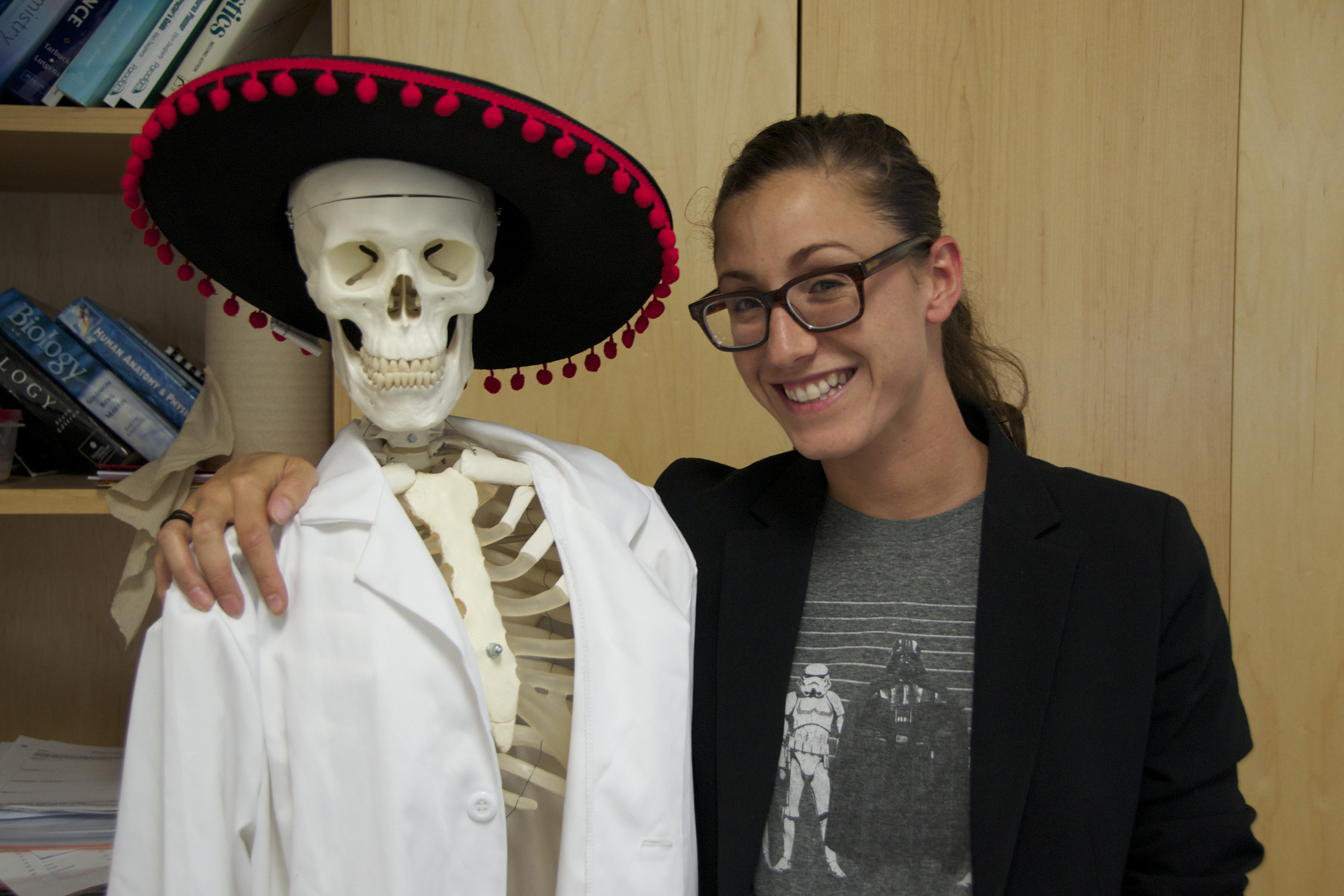
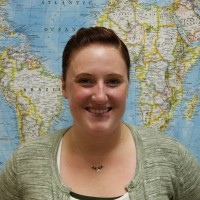
What is the greatest feeling you experience as a teacher?
There’s a lot of great feelings associated with being a teacher. It can be like little things, like thank you’s from the student, but one of the biggest things about being a teacher is making a difference, especially to those students who are not as willing learners. It’s helping them see that they can do well, and they end up doing well; it’s kind of just this [magical] moment as a teacher when you’ve gotten to kind of see the effect that you have on your students.
How has crew affected you today? (Caldwell rowed in college.)
One of the biggest things in crew, not that I wasn’t already disciplined, [is that] it really strengthened my discipline, and so it really helped me out as a teacher just being able to — there’s so many things you need to do as a teacher right, and it helped me be a better planner and kind of really just utilize my time.
What is one of your favorite projects or activities you’ve done with your students?
One of my favorite projects that I’ve done was actually a trench warfare simulation. The [students] line up outside and the teacher is kind of a drill sergeant … I put my students through bootcamp, and then we brought them back inside, and as the students were entering the room, there were obstacles in their way. My students ended up crawling into the room, and then, again, there were obstacles to get them to their trenches, and there was a whole lesson throughout. There were lecture notes and all that stuff, but it was the whole block period where they were sitting in the trenches, in the dark, listening to the sounds of war, and it did involve some paper throwing. Those were their bullets; they threw paper at each other.
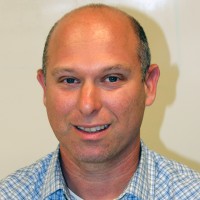
Was it in college that you decided that you wanted to become a teacher, or did you know that you wanted to be a teacher your entire life?
Actually, I didn’t know in college. As an American Studies major, the common jobs after that were either teaching or law school. And the idea of law school never really appealed to me, but I worked a few jobs before becoming a teacher. I had a research job and I think it was while I was working that I decided — I was doing some educational research actually, with the UN — while I was doing that, I think I realized that actually my passion was working more with people than doing research, so that’s what got me into the teaching business in the first place.
What’s your favorite part about teaching Government?
Government is about getting out into the community and getting politically involved. Attending city council meetings, participating in a local campaign, volunteering in the community — some of our students are already doing that, I know that because I’ve read letters about it, and so I’d like to get more seniors doing that because I think that’s what keeps our communities strong and active. I [actually] took two groups of students to Haiti before for my last school. Both different, very different circumstances: one was after the 2010 earthquake; we were part of the rebuilding effort, and the other was through an organization that built schools for developing countries, and we got to go as a group of students. I chaperoned both of them and that was really unusual thing, but I’ve traveled to both developed and developing countries so having that experience and connecting that to World History as well as CWS, which will be the second semester of sophomore year, I’m really excited to teach that class this year.
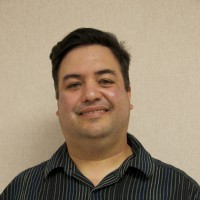
What inspired you to become a teacher in the first place? Did you have a teacher that you looked up to?
Unfortunately, in the high school that I graduated from, at the time, we didn’t have a music program. There was no music program, there was only drama and visual art for the art electives. So I had a drama teacher that was a huge influence on me and really helped me break out of my shell with talking to people and sharing what I knew about stuff … I did have a choir teacher once try to talk me out of being a teacher. She said, “You don’t want to do that.” And I said, “Why not?” because I had said I was going back to school to study to get my credential, and she says, “You don’t want to do that because the pay is not good and you won’t be respected.” While that may be true for some and while I have some colleagues that may have experienced some of those things, I think over the long haul, surrounding yourself in a really great environment with people that support you is a huge boost that also bodes well for the students, too, because when they see that you’re supported and you’re doing your best, then they’re going to elevate and do their best, too, a lot of them, not all of them, but you just gotta find what reaches kids, I think.
In your health class, do you think you’re able to intertwine music into your teaching? (Cotrell is the music director at Capuchino.)
Certainly one of the main things we talk about at the very beginning of the class is self-awareness [and] how we are able to cope with stresses, and I know students have a lot of stresses placed on them every day. I’m not saying everyone should play music. You should have something that helps you to balance out things in life and to be be able to help you cope better.
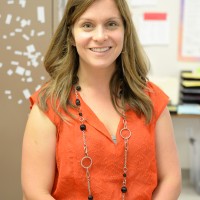
What was your experience of teaching English in Mexico like?
It was in this small town called Pachuca, north of Mexico City. The town was remote, and I was probably the first American they had ever seen. I was helping teach English to kids between kindergarten and sixth grade … I lived in the house of the director of the school. They paid me a very small amount of money, but provided me with room and board and food. I did it for the experience—to immerse myself in the culture.
Have you taught any other classes before?
I used to teach an AVID class, but this year I’m doing instructional coaching, which is new for the district. There are three of us teachers … [it’s] a very rewarding opportunity. I really love working in teacher education … I feel that the collaborative nature and professional development is so powerful. I improve my teaching, because of that collaboration and camaraderie, to better the student learning; it’s so valuable. Teachers, especially at this school, have such great energy and it’s really fun to work with that, and be a part of [it].
Why do you like teaching Spanish?
One of my favorite quotes by Nelson Mandela is: “If you talk to a man in a language he understands, that goes to his head. If you talk to him in his language, that goes to his heart.” This is a quote that has been really inspiring [because] once you can communicate in someone’s native language, it opens up a whole new relationship, which is really powerful. That is what I try to inspire in my students: to want to travel and learn new languages so they can make those connections and relationships that they wouldn’t been able to have made otherwise because we live in such a melting pot … Seeing that extra spark, new personality, new energy come out from [the students] is really amazing to me.
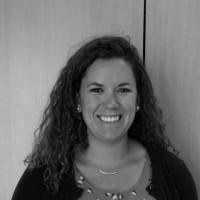
Can you tell me about the most inspirational moment you’ve had as a teacher?
I don’t know about an exact moment, but I find it very rewarding to teach students who have historically struggled with math. So, it’s very rewarding and inspirational to have a student get something … that they’ve tried to learn three or four times … and have kids say, ‘Oh, that’s not that hard.’ I like that.
What do you enjoy doing in your leisure time?
I like running races. I’m running a half-marathon in November.
If you could travel anywhere in time and space, where would you go and why?
I guess [I’d go] back in the day to see my parents … at my age. You know, what was it like when they were teenagers, what were they like when they were in their early twenties? First of all, because they grew up in this area also … and then, to see them before they were parents, and what their life was like.
What’s your favorite Disney movie?
My favorite Disney movie is The Lion King because it has jokes in it that you probably wouldn’t get the first time.
What’s something quirky about your personality?
I like to give deadpan answers to students who ask ridiculous questions, like, “How many points is this worth?” I like sarcasm, which some people don’t get, which is hard, especially with teenagers, but, when they do get it, I find it funny. And they’re usually, like, “Wait for it,” and then they get it.
If you could be any movie character, who would you be and why?
I’d want to be in Harry Potter, but I’d want to be one of his sidekicks. I’d love to have magic powers.
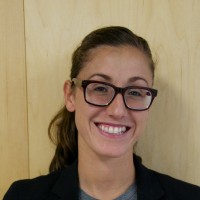
How did you choose to teach science?
I always liked science. I was really bad at writing, and my math is terrible. I was a bio[logy] major in college. Originally, I wanted to be a vet, but that didn’t work out. After college, I was thinking about what to do, and I had some friends that were teachers. [They] helped me look at teaching programs, and so I did that. I thought: “I liked my science teacher. Why don’t I be a science teacher?”
What are your favorite parts about teaching?
I really like that it’s not boring. All my other friends have desk jobs … I like that it’s something new everyday and I’m out of my seat. [Supposedly] sitting for too long isn’t very healthy. I really like to get to know the students … and be involved. It’s fun!
Do you have any goals while teaching at Aragon?
I just want to be part of the community, join in on things and get students to recognize me. You know there are always those teachers that [all the students know]. I want to be one of those teachers, that when you walk down the hall, people say hi to them.
Do you have anything on your bucket list?
I don’t have anything glaring [on my bucket list] right now, but maybe skydiving. I like trying new things. I would like to do ecotourism, where you go and hike, [seeing] different remote parts of the world, and things that a lot of people [normally don’t].
If you were on an island, what three things would you bring with you?
My dog, to keep me active; a Kindle, loaded with books, because I love to read; and a pocket knife for survival.
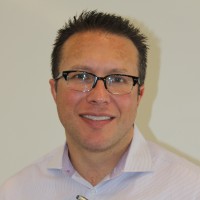
What made you want to become a teacher?
In college, I worked as a math tutor. I enjoyed making connections with people who thought they didn’t like math before and helping them become successful in it. We tend to not like things that we think we suck at, so helping people get over that stumbling block of not being successful is what motivated me. It was the initial experience of tutoring and the enjoyment of helping people get a better understanding and make them seem like it’s not impossible that inspired me.
How do you hope to inspire your students?
Part of it is just having a positive attitude and always smiling. It’s showing people what’s possible. In the beginning, I would start with a problem that anyone can solve, get into, and not get discouraged by. Then, by working through the problem together, everyone can eventually reach the same final expectation. It’s starting with a low entry and ending with a high exit.
Who are people that you find inspirational?
My wife is someone who inspires me everyday. She is amazing, compassionate, caring, and makes me a better person.
What are some cool things you enjoy in free time?
I enjoy politics, and since I don’t like sports, politics are like sports for me. Instead of throwing a Super Bowl party on game day, I throw election parties on election day.
Why’d you choose to teach math?
To be a well-rounded individual, you don’t just stick with what you are good at and what you already know, but you’re able to teach and know a variety of subjects.
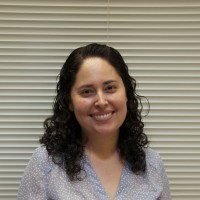
Why did you decide to become a teacher?
I actually started out in the corporate world as a tax accountant. As part of my job, I liked to train new interns. While I was training them, I realized that I really enjoyed teaching.
What is your favorite part of teaching?
I love to see students critically think and begin to understand the world better. I try to open my students up to different perspectives and empathize with those around them.
How did you learn Spanish?
I grew up in a Spanish-speaking household; my grandparents were immigrants from Mexico. Speaking Spanish ties me back to my cultural heritage, and I think it is important to know where your roots come from. When I was in my corporate job, I was the only person in my department who spoke Spanish, so I had to communicate with all the other people from Spanish-speaking countries. Knowing another language is such a valuable tool.
What is your favorite Disney movie?
My favorite movie is Robin Hood because he battles injustices by stealing for the poor.
What are some of your hobbies outside of school?
I love to hike, dance, read, and write. Writing is my creative outlet, and occasionally I get inspired to write poetry. As for reading, I admire the book In the Time of the Butterflies by Julia Álvarez, and I actually read it in both English and Spanish.
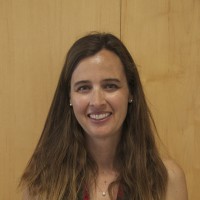
Can you tell me a little about yourself?
I went to college at UCLA. I was a biology major, and I started student teaching here at Aragon
from 1995 to 1996 with Ms. Ward and Mrs. Daniel. I worked here for 11 years. After my third
child, I took some time off, so I’ve been away for 8 years, and here I am again.
Why did you major in Biology?
It was really interesting to me in high school, and it was also one of my more challenging
subjects.
Why did you think that not was the best time to come back to Aragon and teach again?
All my kids are in school, and [Aragon] had exactly what I needed in terms of position. They had
a chemistry position at the times my kids were in school, so I was ready.
Why did you want to teach chemistry?
I really enjoy the subject. I wasn’t a chemistry major, but…Chemistry was the only way I could
[student teach] and I had enough education in chemistry to teach it…I enjoy the students, I enjoy
the math aspect of it, and the labs.
What do you enjoy about teaching specifically?
It’s funny, I really enjoy teenagers. People think I’m strange, but when my kids were in school I
volunteered a little bit with elementary school kids and they’re fun, but I really enjoy this age
group.
Why do you like teenagers so much?
I think it’s because they’re reasonable and impressionable at the same time.
What do you like about Aragon?
It’s just a great school. The collegiately here is fantastic. The adults who work here, the families
of the kids who go here. It’s a really special community.
Can you tell me one random fact about yourself?
I am horribly addicted to trashy reality TV.




